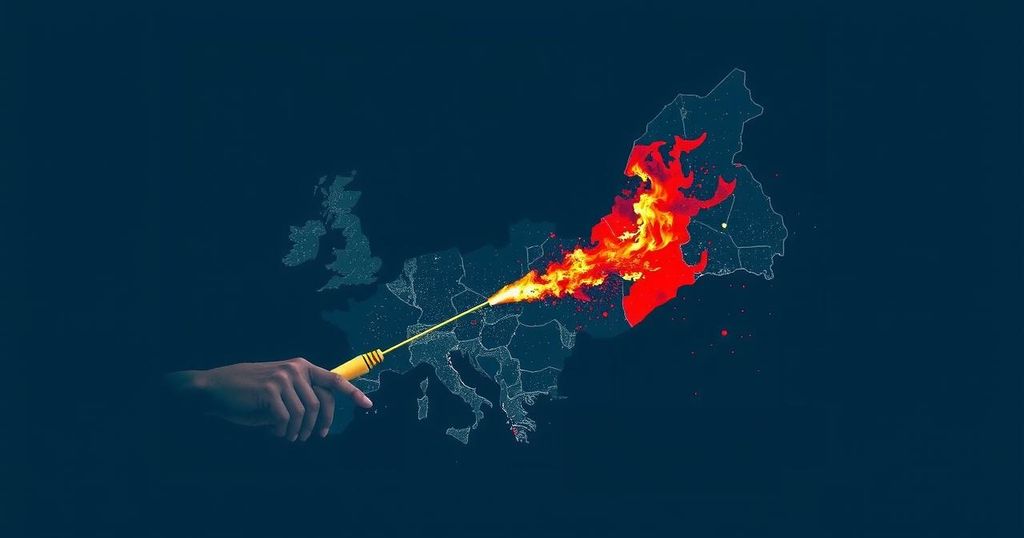Egypt’s President Abdel Fattah el-Sisi has proposed a two-day ceasefire in Gaza to facilitate the exchange of Israeli hostages and Palestinian prisoners, amidst continued military actions that have resulted in significant casualties. The proposal calls for negotiations to resume shortly after the ceasefire, reflecting ongoing efforts by the international community to address the conflict that has escalated since October 2023.
On Sunday, Egyptian President Abdel Fattah el-Sisi proposed an initial two-day ceasefire in Gaza to enable the exchange of four Israeli hostages held by Hamas for Palestinian prisoners. This initiative was announced during a press conference in Cairo, where President el-Sisi was joined by Algerian President Abdelmadjid Tebboune. The announcement comes in the wake of Israeli military operations that have resulted in the death of at least 45 Palestinians in Gaza. President el-Sisi underscored the importance of resuming negotiations within ten days following the ceasefire to strive for a more permanent resolution to the ongoing conflict. This development aligns with renewed discussions taking place in Qatar involving high-level officials, including directors from the CIA and Israel’s Mossad intelligence agency. While there was no immediate feedback from Israel or Hamas regarding the proposed ceasefire, a Palestinian official involved in the mediation process expressed optimism about Hamas possibly being receptive to the new offers. However, this official emphasized that any resultant agreement must lead to an end of hostilities and the withdrawal of Israeli forces from Gaza. Israeli authorities maintain that a conclusion to the conflict is contingent upon the neutralization of Hamas as both a military force and a governing body in Gaza. The United States, along with Qatar and Egypt, have taken a prominent role in negotiating a ceasefire following the escalation of violence that has erupted since Hamas’s incursion into southern Israel on October 7, which left approximately 1,200 people dead and over 250 hostages taken according to Israeli reports. The ongoing hostilities have resulted in severe humanitarian impacts; Gazan health officials report a death toll approaching 43,000 due to Israeli military actions, leaving the territory significantly devastated. Reports indicate that recent airstrikes have intensified, with 43 Palestinians reported killed on Sunday alone in northern Gaza amidst continuing confrontations between Israeli troops and Hamas fighters. UN Secretary-General António Guterres voiced serious concerns regarding the humanitarian crisis in northern Gaza, characterizing the conditions as “unbearable” and condemning the conflict’s conduct as being indifferent to international humanitarian law. The Israeli military announced that they are looking into claims of an airstrike targeting a school in the Shati refugee camp, which resulted in nine fatalities and numerous injuries. Israel claims compliance with international law, contending that their military efforts are directed against Hamas operatives whom they allege use civilians as shields, a claim that Hamas has refuted.
The proposal for a ceasefire in Gaza arises in the context of ongoing conflicts since October 7, when Hamas militants launched an attack on southern Israel, which resulted in numerous casualties and hostage situations. The subsequent Israeli military responses have led to significant casualties on both sides, particularly in Gaza, creating a dire humanitarian crisis. The international community, led by nations such as the United States and frameworks like the UN, has been actively seeking pathways to de-escalate the situation and secure the release of hostages while addressing the humanitarian needs of the affected populations. Diplomatic talks, including those in Qatar, have aimed to facilitate negotiations between the warring factions and bring about a potential resolution.
In conclusion, the Egyptian proposal for a two-day ceasefire in Gaza represents a significant diplomatic effort to initiate dialogue aimed at the exchange of hostages and Palestinian prisoners amidst escalating violence. While the response from both Israeli and Hamas representatives remains unclear, the ongoing negotiations reflect the urgent need for a humanitarian pause in military operations to address the severe consequences of the conflict. International observers are closely monitoring developments as efforts continue to secure peace in the region.
Original Source: themedialine.org






